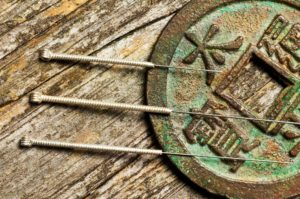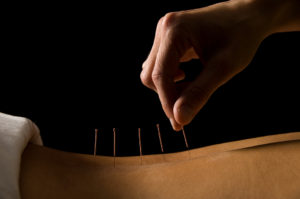What is Acupuncture?
 Acupuncture involves the insertion of very thin needles at strategic points on the body. A key component of Traditional Chinese Medicine (TCM), acupuncture is commonly used to treat pain and a number of chronic health conditions. It is also used for stress management and overall wellness.
Acupuncture involves the insertion of very thin needles at strategic points on the body. A key component of Traditional Chinese Medicine (TCM), acupuncture is commonly used to treat pain and a number of chronic health conditions. It is also used for stress management and overall wellness.
In TCM, acupuncture is a means of balancing the energy or life force known as Chi (pronounced “chee”), which flows through pathways called meridians. Illnesses and injuries create disruptions to the Chi. By inserting needles into specific points along the meridians, an acupuncturist helps re-balance the body’s energies.
Western practitioners view the acupuncture points as places to stimulate nerves, muscles and connective tissues. Research has shown that acupuncture can enhance the immune system, reduce inflammation and swelling, and increase the production of endorphins (natural painkillers) and serotonin (an anti-stress hormone).
 For those who can’t tolerate needles
For those who can’t tolerate needles
For those with extreme aversion to needles, there are other ways to stimulate acupuncture points. These include cupping, acupressure, acu-magnets or press pellets, Chinese massage, and Qi Gong.
What acupuncture can treat
The World Health Organization has named many conditions which respond favorably to acupuncture. The following are designated as “proved – through controlled trials – to be an effective treatment”:
- Adverse reactions to chemotherapy or radiation
- Allergies and hay fever
- Ulcers, gastritis, gallstone or kidney stone pain
- Depression
- Dysmenorrhoea (painful periods)
- Headache, facial pain, neck pain
- Dental and TMJ pain
- Hypertension, essential
- Hypotension, primary
- Knee pain
- Low back pain, sciatica
- Breech position of the fetus, delayed labor
- Nausea, morning sickness
- Postoperative pain
- Rheumatoid arthritis
- Sprain, tennis elbow
- Stroke
Other conditions “for which the therapeutic effect of acupuncture has been shown” include:
- Acne
- Alcohol, tobacco and drug dependence
- Bell’s palsy
- Asthma
- Type 2 diabetes
- Female infertility
- Fibromyalgia
- Herpes zoster
- Insomnia
- Lactation deficiency
- Male sexual dysfunction
- Meniere’s Disease
- Obesity
- Osteoarthritis
- Postoperative recovery
- PMS
- Raynaud’s syndrome
- Recurrent UTIs
- Ulcerative colitis
What you can expect
An initial evaluation and treatment lasts 60 – 75 minutes. The acupuncturist will ask some questions, and may also look at the shape, coating and color of your tongue, or feel the strength, rhythm and quality of the pulse at your wrist.
During the procedure
Acupuncture points are found all over the body. Sometimes needles are placed far from the problem area. Your acupuncturist will tell you which areas will be treated and whether you need to remove any clothing. A gown or sheet is provided. You lie on a padded table for the treatment, which involves:
- Needle insertion. A typical treatment requires 5 to 20 needles. Because the needles are so thin, most of the time people barely feel them.
- Needle manipulation. The acupuncturist may gently move or twirl the needles, or apply heat or a mild electrical pulse.
- Needle rest and removal. In most cases, the needles remain in place for 15 to 20 minutes while you lie still and relax. There is usually no discomfort during rest or removal.
After the procedure
People may feel relaxed or energized after an acupuncture treatment. There may be an immediate relief of symptoms, or a more gradual improvement.
Follow-up appointments may be as short as 30 or 45 minutes, depending on what is needed. A typical treatment plan calls for one or two treatments a week at first.
The number of treatments depends on the condition being treated and its severity. Six to eight treatments are common, though some conditions resolve after one or two and some conditions may require a more extended treatment schedule. As with every other form of healthcare, not everyone responds to treatment in the same way. If your symptoms don’t begin to improve within a few weeks, acupuncture may not be right for you or for your particular condition.
Final thoughts
Acupuncture has few side effects and is effective for a number of chronic and acute conditions. It can be highly beneficial on its own, it is often a valuable supplement to conventional medical treatments, and it is worth a try if you are not seeing results with other forms of healthcare. Contact us for more information or to schedule an appointment.
